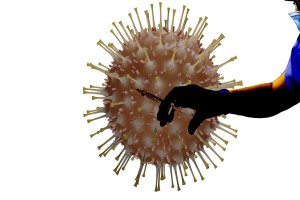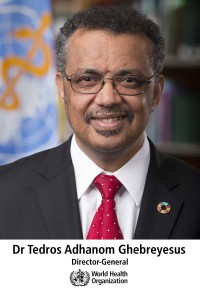
[the_ad_placement id=”adsense-in-feed”]
Geneva: The World Health Organisation has set a goal to deliver at least two billion doses of safe, effective COVID-19 vaccines by the end of 2021. A number of vaccines are now in the final stage of clinical trials and the WHO hopes that to have multiple successful candidates that are both safe and effective.
 Disclosing this here on Monday, WHO Director-General Dr. Tedros Adhanom Ghebreyesus said, “There is light at the end of tunnel and as I said last week, together we can do it”.
Disclosing this here on Monday, WHO Director-General Dr. Tedros Adhanom Ghebreyesus said, “There is light at the end of tunnel and as I said last week, together we can do it”.
He informed that following his letter to all Member States requesting them to join the vaccine arm of the Access to COVID-19 Tools (ACT) Accelerator, already 172 countries had got engaged with the COVAX Global Vaccines Facility – the vaccine pillar of ACT Accelerator, which had both the largest and most diverse COVID-19 vaccine portfolio in the world.
[the_ad_placement id=”content-placement-after-3rd-paragraph”]
He further informed that at present there were nine vaccines that were part of this dynamic portfolio which was constantly being reviewed and optimised to ensure access to the best possible range of products.
“Even now, discussions are ongoing with four more producers and a further nine vaccines are currently under evaluation for the longer term,” he informed. According to him, the Facility was the critical mechanism for joint procurement and pooling risk across multiple vaccines so that whatever vaccine was proven to be safe and effective – all countries within the Facility would be able to access them.
“We’re working with vaccine manufacturers to provide all countries that join the effort timely and equitable access to all vaccines, licensed and approved. This doesn’t just pool risk, it also means that prices will be kept as low as possible,” he said.
In order to be able to secure enough doses to rollout the vaccines, the next step for the partnership is for countries to make binding commitments in support of the COVAX Facility since there were fears that new research outlines that global competition for vaccine doses could lead to prices spiking exponentially in comparison to a collaborative effort such as the COVAX Facility. It could also lead to a prolonged pandemic as only a small number of countries would get most of the supply.
“Vaccine nationalism only helps the virus,” Dr. Ghebreyesus said, while pointing out that the world had so far invested 12 trillion dollars in keeping economies moving. He argued that as governments invested trillions into economic stimulus, the COVAX Facility offered a huge return on investment. While saying that the WHO was grateful for the funds already committed towards the COVAX Facility, he said more was urgently needed to continue to move the portfolio forward.
“Investing in the COVAX Facility is the fastest way to end this pandemic and ensure a sustainable economic recovery. Through the allocation framework, COVAX will ensure that low-, middle- and high-income countries all receive the vaccine in a timely way as soon as there is supply of a safe and effective vaccine, he said. He added: “The success of the COVAX Facility hinges not only on countries signing up to it, but also filling key funding gaps for both the research and development work and to support lower-income economies within the facility.Our only way out of this pandemic is together.”
He reiterated that while initially, when there would be limited supply, it would be important to provide the vaccine to those at highest risk around the world. This included health workers, as they were on the frontlines in this pandemic and critical to saving lives and stabilising the overall health system; people over 65 years old and those with certain diseases that put them at higher risk of dying from COVID-19.
“As supply increases, the next stage of the vaccine rollout would be expanded based on an assessment of each country’s vulnerability to the virus.
Dr. Ghebreyesus though cautioned that while investing collectively in research and development on vaccines, “we need to also use the tools at hand that we have now to suppress this virus”. He said as governments honed their track and trace systems to test, isolate and care for patients, and trace and quarantine their contacts, everyone can play their part.
“If we all physically distance, clean our hands regularly, wear masks, and keep informed, we can collectively break the chains of transmission. Do it all. Do it all, now,” he said.
– globalbihari bureau
[the_ad_placement id=”sidebar-feed”]




